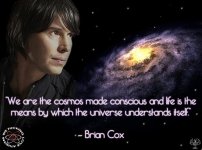Having a story of origins isn't a choice. And it's not religious to have one, so if that's your problem with what I've said then rethink it.Should we teach evolution and science appropriately in schools? Of course. But I don't think we need to revere it to the point that it becomes a central theme in our lives, nor does anyone want to do that outside of a small subset of atheists.
We behave in line with how we think the world is. If we think it's a place that we visit temporarily as spirits-encased-in-bodies, we sacrifice living beings and engage other magic to propitiate spirits (the theistic worldview). If we think it's a place where humans are the only entities with minds, we try to make the world comfortable for that "special" species and rip it to pieces (the enlightenment worldview). If we think we're kindred to the rest of life, we will hopefully (when the paradigm shift is more complete) live more cooperatively with the rest of life (the evolutionary and ecological worldview).
Notice that biology doesn't determine WHAT we believe, just that we all like to believe things. If a lot of people are disinterested in science's story, that's why celebrating it openly in our culture matters a great deal.
I agree that showing respect for science openly is a great thing - I just think it's a bit optimistic to think that science or it's implications will ever resonate for communities at large. I could draw a few analogies, but a simple one is comparing science to math. If you asked most people their feelings about math they'd probably be happy that some smart, nerd somewhere is quietly figuring out difficult problems, and that'd be about the extent of it. Similarly with science, many can appreciate scientific innovation, but it's not a field that brings warmth and joy to the individual. And more often, quite the opposite.
When I mentioned religious dogma, what I meant is that I increasingly get the feeling from people at this message board that science and rationalism are revered in the same way Christians revere God. They have a distinct faith that science is good and is going to be the answer to all of our problems. But you know who else revered science and progress? Europeans who ended up obliterating a significant proportion of our world's cultures.
And that's why my antennae are raised when I hear people talking about celebrating evolution. It shows a kind of reverence for an ontology that most humans simply do not share, and that I think should definitely be viewed with a certain sense of realism.

